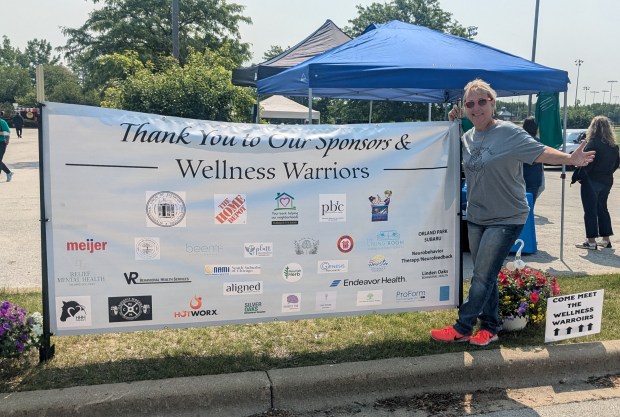Reacting to a demonstration of approximately 40 people with drums, bullhorns and noisemakers outside the home of U.S. Rep. Brad Schneider, D-Highland Park, in the wee hours of July 29, the city now has rules regulating conduct in residential areas.
Criticizing Schneider’s position on the current war between Israel and Hamas, the demonstrators chanted phrases like, “Free free Palestine. Schneider, Schneider you can’t hide, you’re supporting genocide’ and “if we don’t get no justice, you don’t get no sleep.”
A member of the House Foreign Relations Committee and a strong, longtime supporter of Israel, Schneider is a leader in Congress on Middle East issues.
Though Schneider said in an interview on July 31 he did not hear the chants but was awakened around 3 a.m. when the Highland Park police came to his door as they were in the process of de-escalating the situation, his neighbors were awakened and disturbed.
“This is more like the Ku Klux Klan coming in the middle of the night with covered faces like they’re going to burn a cross,” Schneider said then. “This is intimidation and scare tactics. It was frightening for my neighbors.”
The Highland Park City Council unanimously approved a resolution and ordinance Monday, July 29 at City Hall limiting the times people can picket in residential areas and doubling the fine for violations of the ordnance.
“These measures will strengthen the city’s ability to respond to incidents such as the overnight protest at private residents,” Highland Park Mayor Nancy Rotering said at the meeting.
Picketing is now prohibited within 250 feet of any property used for residential purposes before 9 a.m. and after 8 p.m. The fine for violating the ordinance was doubled. Areas like the lawn in front of City Hall are more than 250 feet from individuals’ homes.
“These new regulations will provide law enforcement with additional measures that can be pursued to address unlawful activity and frankly protect the peace of our community, particularly during the overnight hours,” Rotering said.
Steve Elrod, the city’s corporation counsel, said crafting legislation that assures safety for people in their homes while not running afoul of free speech guaranteed by the First Amendment of the United States Constitution is a delicate balance.
“We narrowly tailor our regulations so that it meets a legitimate governmental goal,” Elrod said at the meeting. “Our governmental goal here is quiet enjoyment in your home. We designed this so we are protecting our residents and we’re still acknowledging there is a right to free speech.”
Council member Annette Lidawer said the ordinance is “a good beginning.” She was assured it would not hamper vigils some community members hold usually in public places like Port Clinton Square and in front of City Hall.
“You have taken state law and particularized it to our situation, our community, which is a highly residential community,” Lidawer said. “You made sure the time, place, manner as well as the rights of people are protected. Security was your number one concern.”
Rotering said these two new laws are a beginning and other steps remain under consideration.
During a Committee of the Whole meeting on July 15, Rotering said prohibiting wearing masks at protests or rallies — many of the demonstrators at Schneider’s home wore masks — was possible. Getting informational notice from rally organizers is also a possibility.




